Well I was born in a small town
And I live in a small town....
- John Mellencamp
The lyrics to John Mellencamp’s 1985 hit, “Small Town”, would almost seem to have been written for the teenagers who came together almost two decades earlier to form The Chentelles in tiny Fennville, Michigan. Located in the southwest part of the state, roughly eight miles from Lake Michigan, the city is located in what is known as the state’s ‘fruit belt’. Back in the 1960’s the majority of jobs, including part-time work for Fennville’s teens in the summer, were centered in some way around the cherries, apples, blueberries, and peaches grown on local farms.
The Chentelles were the first rock and roll band formed at Fennville High School which, in the 1960’s, drew students from the surrounding small communities and rural areas of Allegan County. The band’s lone single was recorded at Dave Kalmbach’s Great Lakes Recording Studio in Sparta, Michigan, in early 1967, and issued on his legendary Fenton label. Over the years, one of those sides, “Be My Queen” has appeared on several garage band compilations and copies of the rare 45 rpm have fetched over $1,200 in online auctions.
John Willerton (rhythm guitar/vocals) has fond memories of growing up in a small town, which in the 1960’s, had a population of fewer than 1,000. “It was delightful living in Fennville as a youngster. We had so much freedom as children to grow and explore. Everybody knew everybody else. As children, we could go out in the woods whenever we wanted or ride our bikes 5 miles to go swimming at a nearby lake. We had to be home by dusk, but there was a lot of freedom.”
Bill Dalton (keyboards/vocals) echoed those thoughts: “I feel lucky to have grown up in a small town where there were no strangers. At times, it felt like we were out of touch with the rest of the world, but rock music provided the connection with everyone else.” 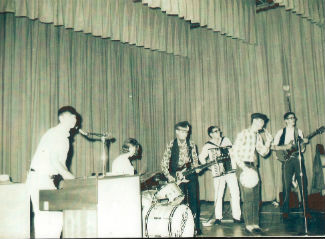 The Chentelles at Fennville High (L to R) Bill Dalton, Barb Overhiser, Bruce Smiertka, Dennis Smiertka, Mark Adams, John Willerton
The Chentelles at Fennville High (L to R) Bill Dalton, Barb Overhiser, Bruce Smiertka, Dennis Smiertka, Mark Adams, John Willerton
The main rock and roll radio connection for Fennville teens was WLS-AM out of Chicago; a hip, urban-minded contemporary-hit station featuring a small army of DJs, including Larry Lujack, Dex Card, Ron “Ringo” Riley, Art Roberts, and Don Phillips, who spun the latest platters 24 hours a day. WLS was one of the first stations to embrace The Beatles and the other British Invasion bands. The effects of this were certainly felt in Fennville. Bill Dalton remembered: “We had Beatles parties where someone would bring the latest album and we’d listen to the Fab Four all night long. Mostly, we made out with our girlfriends, but we loved The Beatles too.”
Both Dalton and Willerton remember Alexander’s Drug Store as the main teenage hangout in town, and where they’d drink cherry Cokes, eat pretzels, and listen to the small pushbutton jukeboxes on the counter while flirting with the girls who worked there.
Fennville was not large enough to support a record store, so unless teens could manage a ride to another town, their choices were limited. Van Hartesveldt’s grocery store had a record section and that’s where Willerton bought most of his records. He got a job at 15 in the produce and dairy department and got a store discount on his album purchases.
Mark Adams (bass/vocals) came to Fennville from Chicago in 8th grade after his father had been transferred to take a managerial position at the Michigan Fruit Cannery. The factory was Fennville’s biggest employer. Adams quickly became friends with John Willerton as the two boys shared a love of skateboarding. They, and other teens, used to skateboard together on the big hill west of town. 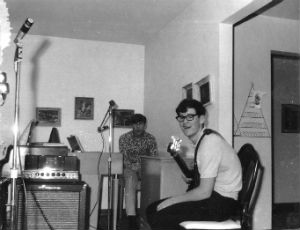 Bill Dalton & Mark Adams
Bill Dalton & Mark Adams
Adams grew up listening to WLS in Chicago, and got into rock and roll music through his older brother who bought Little Richard records. After moving to the small and friendly town of Fennville, he became a big Beatles fan and, like his future band mates in The Chentelles, was heavily influenced by their appearances on the Ed Sullivan Show. Adams’ interest in music was encouraged by his family, his mother taught both piano and organ, and he had started playing guitar in Chicago before moving to Fennville.
John Willerton began playing an acoustic guitar in junior high, strumming along to folk songs like “500 Miles”. He was interested in groups like the Kingston Trio and Peter, Paul and Mary. After he and Mark Adams started hanging out together, the two friends began playing guitar. Their sessions were usually held at the Adams’ house since Mr. Willerton was opposed to any type of rock and roll music.
The parents of Dennis Smiertka (accordion/vocals) and his younger brother Bruce (lead guitar), on the other hand, were enthused about their sons’ interest in music and encouraged their participation in the music/band programs offered by the Fennville public schools. Mr. Smietka had originally been a fruit farmer but had left agriculture to go into the insurance business. He had been a member of a polka band in the 1940’s so, once the Chentelles came together, he was very supportive. Dennis remembered that his dad was helpful in getting them to sing harmonies, and advised them on how to put together a good dance program even though he didn’t necessarily care for the rock and roll music that they played. 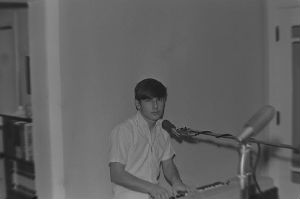 Bill Dalton
Bill Dalton
Bill Dalton's parents grew up in Detroit, but left shortly after they married to take over Bill’s great grandfather’s farm in Fennville. Mr. and Mrs. Dalton were friends with the Smiertkas and the two dads would play an important role in transporting the band and their equipment after the Chentelles started to get gigs. Like Dennis Smiertka, Bill was a freshman when the band formed.
Barb Overhiser (drums) was a junior at Fennville High and a year ahead of Mark Adams and John Willerton. Barb was a member of the high school band and was the only girl at school to have her own drum kit. Bill Dalton draws a picture of her as “a sweet girl who was a damn good drummer, and not just for a girl.” John Willerton, who seemed to have had a schoolboy crush on this ‘older woman’, described her as “beautiful and out of my league” but also as “very conservative and strait-laced.”
Comedian/actor Robin Williams was sometimes credited with the famous line: “If you remember the 60’s, you weren’t really there”; and forty-eight years later, none of the six former teenagers can remember exactly how they came together to form The Chentelles. The general consensus seems to be that the two prime movers were Mark Adams and Bill Dalton. Adams brought in Willerton and then he and Willerton recruited Overhiser. Dennis Smiertka’s now-wife, Lindsey, was friends with Mark Adams’ younger sister, Janine. She remembers that Adams mentioned that he was looking for guitar players for a band and Lindsey mentioned young Bruce Smietka, who often brought his guitar to band class. 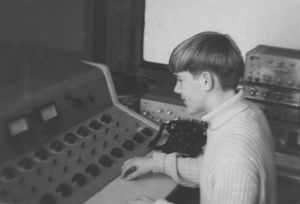 Bruce Smiertka
Bruce Smiertka
Bruce was invited to join and brought along his older accordion-playing brother. Looking back, Bruce has said, “I ended up in the band because, in our small town, there weren’t that many people that played instruments. He started taking guitar lessons when he was 8 or 9 years old, and was inspired by his father, who played the guitar in his polka band.
Smiertka’s aunt lived in Kalamazoo, Michigan, and worked for the Gibson guitar factory. As an employee, she was allowed to buy one per year at wholesale from a collection of “seconds” – guitars that had some kind of blemish. As a result, all of Bruce’s guitars were Gibsons, and the first electric guitar he played in the band was a blue Gibson solid body.
The younger Smiertka was in 7th grade when he joined the Chentelles. Bruce said he felt important as a junior high kid hanging out and playing in a band with older kids who were in high school, and he was the envy of many of his classmates. His parents, on the other hand, became the targets of some negative small town comments over letting Bruce travel around and play rock and roll with older kids when he wasn’t yet in high school. Bruce says that his father had a classic response to the naysayers: “I know where my sons are every weekend. Do you?”
It was the first rock and roll band for all of them, and it was also the first rock and roll band at Fennville High. They had too many guitars at first, but then Mark Adams decided to try to play the bass and, according to Willerton, “discovered how cool it was, and really got into it”. Mark’s dad bought him an Ampeg B-15N bass that he still plays nearly 50 years later. For his part, Willerton had a cousin who worked as a guitar designer for Gibson, and he got John a discount on his first electric guitar, a Gibson Kalamazoo U.S.A. - a red and white solid body guitar and amplifier. 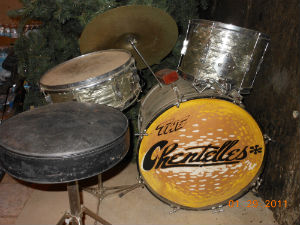 Barb Overhiser's drum kit
Barb Overhiser's drum kit
When it came to choosing a name for the band, Bill Dalton, who like several others was taking a French language class, came up with the name ‘Chansonnette’ – meaning little song. The rest of the band thought it sounded too feminine, and John Willerton reportedly came up with ‘Chentelles’ during a group discussion. Everyone liked it because it sounded similar to the chart-topping Shondells from Niles, Michigan.
According to Dalton, the band practiced at their parents’ houses (usually in the Adams’ large living room where Mrs. Adams had both a piano and organ for her lessons), and also in garages, barns, outdoors if the weather was nice, and at the Masonic Lodge above Dickinson’s Hardware in Fennville.
Mr. Smiertka set up one of the band’s earliest performances, which also had the benefit of providing them with their first bit of publicity. Smiertka was a member of the Fennville Chamber of Commerce and he arranged for The Chentelles to provide the entertainment at the organization’s annual Mixer held at Tempie’s restaurant on March 31, 1966.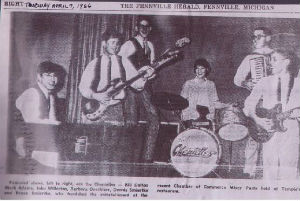 Chentelles at Tempie's
Chentelles at Tempie's
John Willerton remembered that they didn’t have mikes yet, so they had to sing really loud. He recalled that they played two songs, one of which they changed the lyric to “eat Tempie’s pies” because the restaurant was serving homemade pie and coffee at the event. None of the band members can recall the song in question, but according to Willerton, they thought they were being very clever at the time.
A week later, a news article about the event appeared in the Fennville Herald. It included a posed photo with the names of the smiling Chentelles; the boys with their instruments in white shirts and ties and Barb Overhiser behind her drum kit in a white blouse and sweater. Bill Dalton recalled that the band did not have uniforms; “We did try to dress alike as much as possible, except for Barb, who fortunately preferred to dress like a girl.”
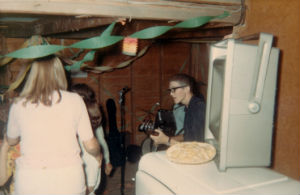 John Willerton at a classmate's party
John Willerton at a classmate's party
John has Polaroids of their first garage rock moment playing at a party in classmate Connie Comeau’s basement. Early songs included among others: “Louie, Louie”, “Money”, “Gloria”, “Bits & Pieces”, “Wooly Bully”, “Do You Love Me”, “Hanky Panky”, and “California Sun”. The Chentelles played at many more Fennville parties and at numerous high school dances.
To help them get gigs outside of their home town, the band hired Terry Wolters as their manager. Wolters lined up dates for the Chentelles at a variety of summer festivals in Allegan County. They played outdoor gigs at both the Portage and Douglas drive-in theaters in Kalamazoo and also opened for Tommy James & The Shondells in Saugatuck during the summer of 1966.
Adams and Willerton were the first to get their driver’s licenses in February 1966, but their parents still did not want them going off on their own, so the band still relied on their folks to drive them to gigs using cars, trucks, and trailers to cart their equipment. In the early days, they had to load Bill’s console organ and haul that around before he got a Farfisa organ that was more portable.
Even though his mother approved, John Willerton’s father did not like the band and thought it was bad for his son to be involved. John remembered; “He didn’t even like Elvis and was very upset by the Beatles and their long hair.” Dennis Smiertka recalled; “Mr. Willerton did not provide any support for the band that I can remember. He had a very strong anti-rock and roll bias."
Willerton’s father would have felt vindicated in his beliefs if he had witnessed any of the ‘keggers’ that Terry Wolters booked for the Chentelles at a number of fraternity houses on the campus of Western Michigan University, about 34 miles away from Fennville. The keggers must have been an eye-opening experience for Bruce Smiertka who was still in junior high. 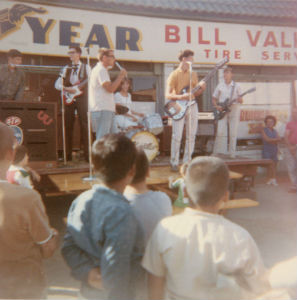 Fennville Days Festival (L to R) B. Dalton, J. Willerton, D. Smiertka, B. Overhiser, M. Adams, B. Smiertka
Fennville Days Festival (L to R) B. Dalton, J. Willerton, D. Smiertka, B. Overhiser, M. Adams, B. Smiertka
Dennis Smiertka remembered that the dads who drove them would drop them off and then disappear while the band played. “It was a good thing because the WMU parties often became drunken brawls. We would move the equipment outside after playing so that our parents wouldn’t see what was going on inside. It was quite a learning experience, and it prepared us for what to expect when we went to college a few years later.”
As the 1966/67 school year began in September, Barb Overhiser was entering her senior year. Dennis Smiertka remembers her as a very good drummer but thought that she was a little uncomfortable with the music they played and with some of the places where they had gigs. John Willerton recalled that she was somewhat inhibited and unable to cut loose on stage. As a result, she couldn’t handle the drumming on “Wipe Out” so classmate Dale Atkins would sit in with the band for that number
The Chentelles did a group photo inspired by the cover of the “Meet The Beatles” album that seemed, in retrospect, to foreshadow future events. Dale Atkins took the photo that attempted to capture the band’s faces in half shadow. It was shot in Mark Adam’s basement with band members in black turtleneck sweaters. Atkins set up a flash on one side of them to produce the effect but, by mistake, Barb Overhiser’s face was photographed completely in shadow.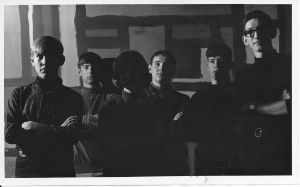 Meet the Chentelles: (L to R) B. Smiertka, B. Dalton, B. Overhiser, D. Smiertka, M. Adams, J. Willerton
Meet the Chentelles: (L to R) B. Smiertka, B. Dalton, B. Overhiser, D. Smiertka, M. Adams, J. Willerton
Much like The Beatles, The Chentelles had their ‘Pete Best moment” when they replaced Barb Overhiser with Dale Atkins before making an important recording. There are several versions of what happened. Mark Adams thought that she was pressured by her jealous boyfriend to drop out. John Willerton said that she was “kind of fired” from the band, but admitted that the boyfriend might have been involved. Dennis Smiertka indicated that the switch to Dale was not a happy one for Barb, but he felt it was best for the band. Bill Dalton, on the other hand said this: “I always thought it was good to have a girl drummer in the band and was sorry when she quit, but Dale Atkins was a great replacement.”
Dale Atkins (drums) grew up in Fennville. Dale and John Willerton went through school together from kindergarten through graduation. His dad was a mechanic and had a trenching company, while his mother worked at the fruit canning company.
Atkins was a drummer in the Fennville marching band. On the dates that he sat in and played “Wipe Out” with the Chentelles, he always used Overhiser’s drum kit. Atkins only got his own set of drums when he joined the band as a full-time member. In comparing himself with Overhiser, Dale said that Barb could read sheet music better than he could, but he had more style on the drums than she.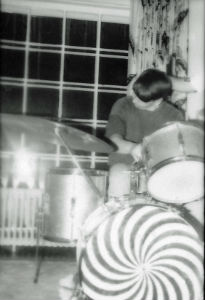 Dale Atkins
Dale Atkins
As 1966 drew to an end, The Chentelles had a repertoire of four dozen songs. Like all teen groups of the time, they played the hits of the day, covering songs by stalwarts such as The Rolling Stones, The Animals, Paul Revere & The Raiders, The Kingsmen, and the Dave Clark Five. The band also had two original numbers that they had been working into their sets, and both had been getting positive reactions from their teen audiences.
“Time” was a dreamy ballad written by Bill Dalton and Bruce Smiertka that drew even the most reluctant male dancers to the floor to get up close and personal with willing female partners. The original that got the most reaction, however, was a rocker composed by Dalton and Mark Adams titled “Be My Queen”. Dalton remembered the excitement it generated: “We’d play ‘Be My Queen’ several times a night because kids loved to dance to it. They’d go crazy!”
None of the band members recall exactly how they heard about Fenton Records and Dave Kalmbach’s studio in Sparta, Michigan, or who came up with the idea of making a record. Adams thought that it might have been their manager, Terry Wolters. He also said that the Chentelles had some money in the band kitty but their parents also kicked in for the recording. Dalton felt that their parents must have handled the business arrangements and couldn’t remember how much it cost, but he guessed that it was around $500, which seemed like a small fortune to the band in early 1967.
Luckily, Mark Adams wrote down the details of Thursday, January 19th in his journal. He wrote that they left Fennville after school at 3:30 PM in a three-vehicle caravan carrying the band, their equipment, and a variety of family members. After a rocky trip that involved a wrong turn by one of the cars and Mr. Smiertka’s truck being pulled over by the State Police, everyone assembled at the movie theater that housed the Great Lakes Recording Studio a half-hour late at 5:30 PM. 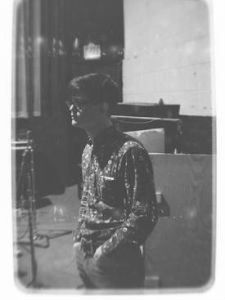 Mark Adams
Mark Adams
Adams indicated that the band recorded both “Time” and “Be My Queen” four times before they got a take they were satisfied with. They then dubbed in the background vocals for both songs. Adams goes on to describe the thrill of hearing the playback of their songs on the large speakers in the studio. The band was shocked, however, when Dave Kalmbach told them that “Time” was “too long” at over 4 minutes.
Dennis Smietka recalled that, never having recorded before, the band never thought to calculate the time for either “Be My Queen” or “Time” before they went to Sparta. Since their session time was almost up, Kalmbach suggested editing the song. Adams wrote that after arguing over where the cut would be made, Kalmbach made the edit at the 3 min. 32 sec. mark of the song, thereby keeping the final version under 4 minutes. In hindsight, it seems surprising that Kalmbach tried to edit the song rather than simply fading it out near the end. The edit is very noticeable in the issued recording of “Time”; and it sounds much like a skip in the record.
Although the band thought “Time” was the a-side of the single, “Be My Queen” has turned out to be the Chentelles’ defining statement. The driving rocker features a great lead vocal by Dalton and some impressive lead guitar from Bruce Smiertka. In addition, Adams provides a memorable scream at the song’s mid-point, undoubtedly inspired by listening to the records of both Little Richard and the early Beatles.
Kalmbach cut five demos for the band to take back to Fennville (the Smiertka brothers shared one) and everyone got back home around midnight. For the next few days, the band was flying high; but they were brought back to earth in a hurry when Mark Adams’ father announced that he was being transferred back to Chicago, and that the entire family would be moving with him.
Mark Adams was understandably devastated by the news. The move was made so quickly that he didn’t even get to hear their 45 played on local radio. To add insult to injury, his name was misspelled as ‘Adems’ on the songwriting credits for “Be My Queen”. The timing could not have been worse. It was the middle of his junior year in high school, the band had just made their first record, and now he had to leave it all behind. He was so upset over the move that he ran away from his new home in Chicago and hitchhiked back to Fennville. But the die was cast, and after returning to his family in Chicago, Mark Adams would lose touch with the other members of the Chentelles for the next 46 years. 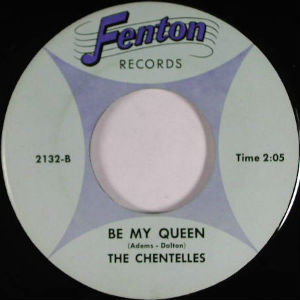
The 45s were pressed at the American Record Pressing plant in Owosso. The first batch of 200 sold out quickly, so another 200 were ordered. Meanwhile the band needed to find a new bassist. Bruce Smiertka recalled that Mark Adams was replaced by Dave Nabb from South Haven. The band advertised for a bass player and he answered the ad. Nabb was older and much more worldly than the rest of the band. Bill Dalton recalled that Nabb “seemed to be high a lot of the time, which none of us had been up to that point”. Dennis Smiertka remembered Nabb as “a good musician, but wild and crazy on stage and he would break guitars like Pete Townshend of The Who.”
John Willerton left the band shortly after Mark moved away. His father very much influenced his decision. Since his dad was not supportive at all, John felt that he was a drag on the rest of the group because his parents were not involved like the others. He also felt it wasn’t worth the continual hassles with his father every time he wanted to go to a gig. Additionally, issues with the other band members had cropped up because he had difficulty making it to rehearsals because of his job in the grocery store.
The Chentelles continued on without missing a beat. They played numerous West Michigan teen clubs including The Warehouse, Noah’s Ark, and The Morgue. Dale Atkins fondly remembered the Edgar Allen Poe teen dance club in Holland: “It was interesting like an underground club that you would read about. It was dark, with weird lights, and it was really fun to play in.”
The band was popular at Fennville High but Dale Atkins said they didn’t change the school’s culture. Athletics still ruled, and the most popular kids with both the other students and the staff continued to be the star athletes and the cheer leaders. Atkins recalled an incident in which the Chentelles got into trouble after their parents wrote letters for a day off from school for "group business". 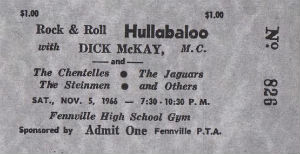 Fennville High Hullabaloo
Fennville High Hullabaloo
They were scheduled to play in a battle of the bands in Holland, Michigan. The Chentelles did well in the competition, but word got back to Fennville High and they were called down to the principal’s office and told that it was not appropriate to take time off from school to play rock and roll. Their parents stepped in and backed them, however, telling the school administration that they felt the day was necessary and that the Holland event contributed to the band’s success. As a result of their parents’ support, the school backed down.
The band continued on for about a year before finally breaking up. No one seems to remember exactly why. Bill Dalton described what came next. “I put together another band called The Embryonic Marshmallow after The Chentelles broke up. Bruce Smiertka and Dale Atkins were in the band, but we added a trumpet player (Leslie “Squeak” Winnie) and had a girl singer (Pam Buscher) out front. She had a great voice and we did lots of Motown (“Dancing In The Street”) and Jefferson Airplane covers (“White Rabbit”, “Somebody To Love”). We came in second in a battle of the bands at the Allegan County Fair where we played before a crowd of about 5,000 people.” The band only lasted a short time, however, and broke up when several key members went away to college in the fall. 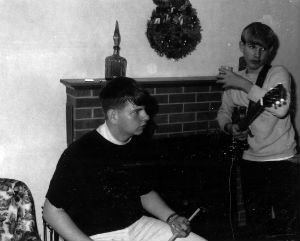 Dale Atkins and Bruce Smiertka
Dale Atkins and Bruce Smiertka
Although the Embryonic Marshmallow did not record, their lead singer did. Following the band’s break-up, Pam Buscher recorded a single on Fenton Records with Dale Atkins on drums. Unfortunately, “Why Is There War” b/w “Why Can’t He Love Me” had the labels placed on the wrong sides of the 45 and Pam’s last name was misspelled as ‘Busscher’.
Mark Adams was the only Chentelle who continued playing in bands, and he has maintained his interest in making music over the years. Adams played in several bands after he returned to Chicago. The most memorable of these was the Berlin Airlift, which once opened for the Shadows Of Knight. Mark is retired and living in Waco, Texas. He plays a variety of instruments and is still writing songs. After learning that Michigan Rock and Roll Legends Hall of Fame ballot contained The Chentelles, Adams began contacting his former band mates. It had been over 46 years since he had spoken with any of them.
Bill Dalton was a journalism major in college, and after graduating, worked at newspapers in Ypsilanti, Ann Arbor, and Grand Rapids. After taking a position at the Kansas City Star as a reporter, Dalton moved up to various editorial positions and retired as the Political Editor after nearly 30 years at the paper. He still resides in Kansas City.
After he and Adams made contact again, they realized they’d left a lot of loose ends with their record that needed to be tied up. These included copywriting the words and music (which they’ve done), and registering with BMI and Soundexchange so that they could perhaps earn some royalties. “Be My Queeen” still gets played on Pandora, and music lovers can buy the song on records and CDs such as Crypt Records’ “Back From the Grave” series, which features 60’s garage bands, many of which appeared on the Fenton label. After the Chentelles were inducted into the MRRL Hall of Fame, Crypt Records offered them a contract to pay them royalties from the albums and CDs the label sold over the years. 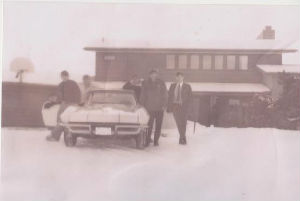 Christmas 1966
Christmas 1966
Dennis Smiertka went to Michigan State University and then followed his father’s footsteps and spent 35 years as a Michigan Farm Bureau insurance agent. Dennis didn’t play in any other bands after the Chentelles, but he has sung in church choirs over the years. Smiertka no longer plays an instrument, and he gave his accordion to a neighbor. Dennis is retired, and he and his wife currently live in Bonita Springs, Florida.
Younger brother Bruce Smiertka is retired as the farm manager for Moneys Mushrooms in Brighton, Indiana, and is currently living in Daytona Beach, Florida. Bruce chose not to play in another band after his days in the Chentelles and the Embryonic Marshmallow. He continued to play guitar for his own enjoyment, however, up until ten years ago. Bruce gave the last guitar that he owned to his son, who had decided to start playing.
Dale Atkins attended MSU and went into photography after graduating from Fennville High in 1968. After college, Dale worked as a photographer at a couple of Michigan newspapers and was nominated for a Pulitzer Prize. He next was hired as a staff photographer for the Associated Press, where he was employed for 22 years. Atkins then spent 17 years as a combat photographer for the Air National Guard. He is retired and currently lives south of Lansing.
Barb Overhiser Souders married, had children, and still lives in Fennville. She declined to be interviewed about her time in the band.
After attending college, John Willerton went into medical photography as a career. He has now moved into Clinical Management in the Department of Ophthalmology at Saint Louis University. The Chentelles was the only band that John was in, but he has continued to play guitar. He performs upbeat Christian music with the senior youth group at his church and is deeply involved with a Lutheran organization called Teens Encounter Christ. After he retires in 2016, John plans to go into fine arts photography.
John says he cannot believe how successful everyone in the band eventually became. His father is now 93 years-old and living in Holland, Michigan. Mr. Willerton knows that John’s band was voted into the Michigan Rock and Roll Legends online Hall of Fame in 2014, and he is almost willing to admit that the dreaded rock and roll experience of his son actually turned out all right.
Reflecting on his days in the band, Bill Dalton probably expressed it best when he wrote: “The Chentelles was one of the great formative experiences of my youth that I’ve never regretted. And it has been very gratifying, after nearly 50 years, for people to still be interested in us and our short-lived musical careers."

